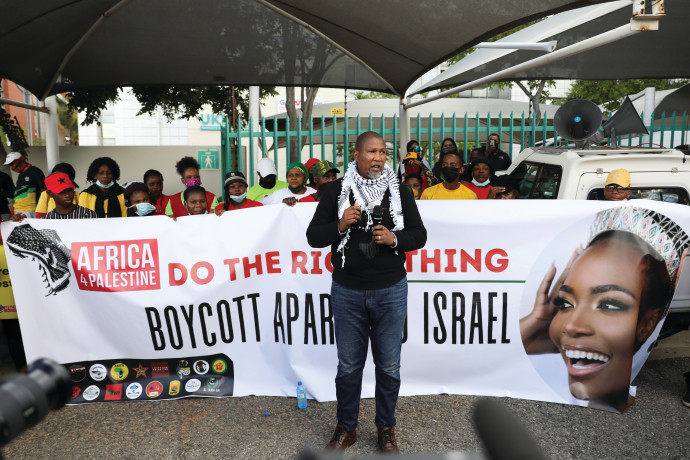As a 16-year-old member of a Zionist youth organization, we demonstrated against apartheid outside the South African London Embassy.
Our heroes were the Jewish anti-apartheid figures in the UK, Israel and South Africa. Almost all those charged in the 1963 Rivonia Trial were Jewish, namely Lionel Bernstein, Arthur Goldreich, Denis Goldberg, Harold Wolpe and others.
Nelson Mandela had noted, “I have found Jews to be more broad-minded than most whites on issues of race and politics. Perhaps because they themselves have historically been victims of prejudice.” I was in Johannesburg on that euphoric day of Mandela’s release.
“I have found Jews to be more broad-minded than most whites on issues of race and politics. Perhaps because they themselves have historically been victims of prejudice.”
Nelson Mandela
Apartheid had begun three years after the Holocaust, promoted by the Nationalist Party and the rigid Verkrampte faction, with a background of antisemitism, expressed through their saying: “the Jew has a white face, but a black heart!” Five years later, I visited the Apartheid Museum in Johannesburg. Any Jewish connection had been removed. The curator was embarrassed by my questions.
In 1994, a Wiesenthal Center sting led to Bariloche, Argentina, revealing a roll of names of neo-Nazis, predominantly in South Africa. This resulted in the arrest of a group bent on bringing European assassins to murder listed members of the official Anti-Apartheid Committee.

For the first on the list, Chris Hani, it was too late. He had been shot by a Polish immigrant, Janusz Walus, close to the white supremacist Conservative Party. Second on the list was Judge Richard Goldstone.
During a visit, I and our then Latin American director, Sergio Widder, were invited by Goldstone to a “thank you” dinner in Johannesburg. We would have declined, if only we had known of his later report on Gaza, castigating Israel.
Identity theft
The Palestinian leadership has constantly committed “identity theft” to validate their own historical narrative, as in the UNESCO World Heritage Committee, where over the years they claimed numerous sites, from the Church of the Nativity in Bethlehem to the Temple Mount, renaming the Kotel “al-Buraq Plaza” and still on the wish list, even demanding property over the Dead Sea Scrolls.
The new “apartheid” campaign against Israel is based on lies and identity theft, adopted by Amnesty International, presently including South Africa and Namibia – the latter bearing a horrifying history.
Moving from Jo’burg to Windhoek, I was hosted by the late Jewish leader Harold Pupkewitz, who pointed out that the capital of Namibia still held streets with German names, such as Kaiserstrasse... a vestige of Germany’s colonial bite of Africa, from 1884 until 1919, lost in the aftermath of World War I.
Indigenous Herero
In 1904, the German colonists began the genocide of the indigenous Herero, Nama and San peoples, who were systematically either deported to the Namib desert, or interned on Shark Island and died of abuse, starvation and medical experiments, by forerunners of Mengele, the monstrous doctor of Auschwitz.
Hundreds of skulls had also been shipped back to German universities. Some form of compensation was only granted in 2021.
Pupkewitz suggested, “if you want a Nazi experience, visit Peter’s African Artifacts in Swakopmund.” The next day, I took an early flight and went to the shop. After dropping a few neo-Nazi names in Europe, I asked where to find Hitler memorabilia.
Peter explained that he was purchasing Nazi artifacts from second- or third-generation Germans who intended to return to the Fatherland. He then opened “abracadabra” revealing shelves of nostalgic hate. These “non-African artifacts” were sold mostly to German tourists.
I bought several original LPs of Nazi songs, especially in praise of the 1936 Berlin Olympics. On the way out, I noticed T-shirts with swastikas. Peter told me they were sold and shipped in bulk to Germany. He then directed me to the Altes Amtsgericht – Hohenzollernhaus, where Hitler’s birthday parties had been annually organized.
Back in Windhoek, Pupkewitz advised to write to president Samuel Daniel Nujoma, the founder of SWAPO (the South West Africa People’s Organization). Wounded in fighting the South African apartheid occupants of Namibia, he was treated by a Jewish doctor, who made him aware of the Holocaust.
Our request was to expel Peter and close down African Artifacts. Due to the fact that he held only a German passport and had no Namibian citizenship, his expulsion was organized by Joshka Fischer, then foreign minister of Germany. Apparently, thereafter, Peter disappeared.
The occupation by South Africa from 1915 until 1990, especially in the years of apartheid, is a case-study abused by those Palestinians dealing in identity theft. We call on both South Africa and Namibia to advise Amnesty International that they will not allow their identity to be abused.
The writer is director for international relations of the Simon Wiesenthal Center.
